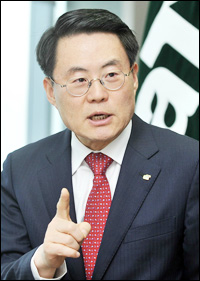Retooling Assembly
Parties should keep word and innovate politics
The National Assembly’s failure to pass an arrest motion for Rep. Chung Doo-un of the ruling Saenuri Party Wednesday is an ominous sign that the 19th parliament will proceed in the direction of disappointing voters, rather than pleasing them.
To be sure, the governing party should be criticized most stringently, but there can be no excuse for opposition lawmakers, either, in that they, in order to protect their vested interests, joined a plot to vote down one of the Assembly’s crucial reform agenda.
While a motion to arrest independent lawmaker Park Joo-sun, who had been convicted of illegal campaigning in the April general elections, was approved by a vote of 148 to 93, the motion on Rep. Chung received only 74 votes, less than one-third of the 271 votes cast.
The voting has been widely seen as a litmus test gauging lawmakers’ commitment to reforming the Assembly as the parties pledged to give up privileges granted to parliamentarians. In June, the Saenuri Party, in particular, suggested the “right not to be arrested’’ as one of the six perks to be forsaken by its lawmakers. In Korea, courts must get parliamentary approval to take a lawmaker into custody while the Assembly is in session.
To begin with, the ruling party must be criticized for demonstrating that words are one thing and actions another. Immunity from arrest came into being to protect opposition representatives from dictatorial governments in the past, but the privilege has degraded into a means of guarding law-breaking representatives. So far, 48 arrest motions have been put to a vote but only 10 were approved. The 18th Assembly approved only one arrest motion in September 2010, when an opposition lawmaker was charged with embezzlement involving a private school foundation.
The main opposition Democratic United Party (DUP) is not free from criticism, either. Given that the liberal party competed with the ruling party with regard to the removal of privileges, its lawmakers deserve blame for joining a scheme to save a colleague suspected of corruption. What really matters is that they applied double standards in the probe of the savings bank scandal _ voicing harsh punishment for Lee Sang-deuk, the elder brother of President Lee Myung-bak, while threatening the prosecution in an apparent bid to protect Park Jie-won, the party’s floor leader. That nearly 80 lawmakers are now under investigation for violating election laws must have affected the voting.
In the wake of the parliamentary veto, Rep. Lee Hahn-koo, the ruling party’s floor leader, offered to quit, and Rep. Park Geun-hye, who has spearheaded the Saenuri Party’s initiative to reform the Assembly as the most popular presidential candidate, is certain to suffer a blow in one form or another.
In a nutshell, the rival parties will have to speed up their reform drives if they are to prove that their latest innovative moves are not a “show.’’ That’s the only way for them to console the people who are increasingly sick and tired of politicians. <The Korea Times>


